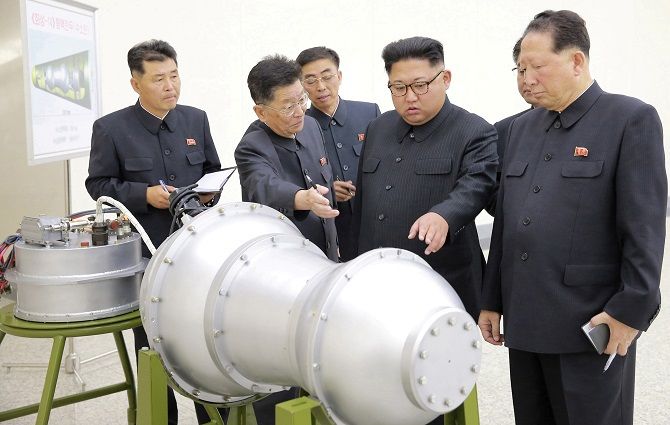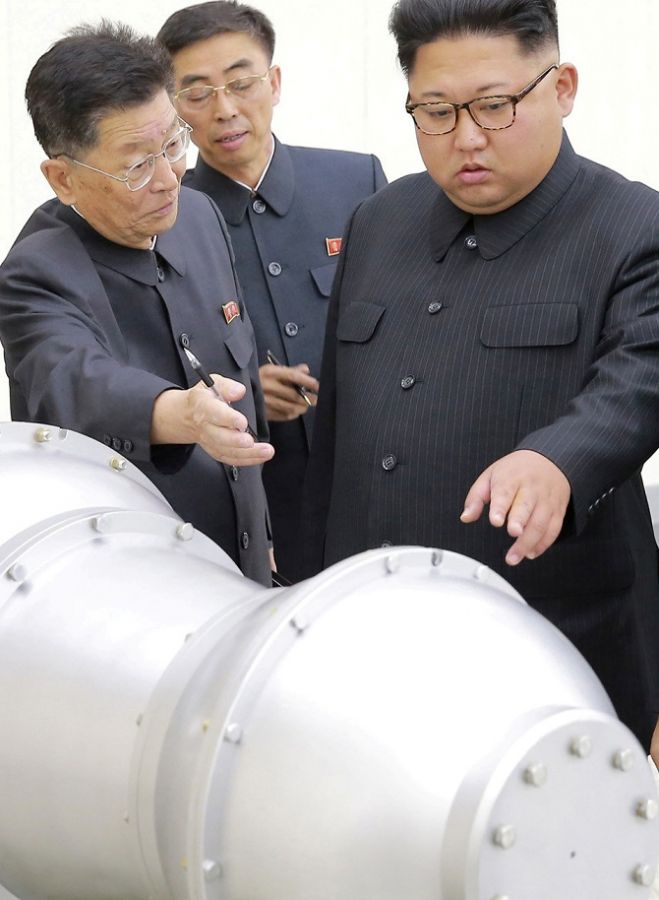The nuclear test of September 3 proved that North Korea's hydrogen bomb is capable of being loaded onto an intercontinental ballistic missile, heightening the real danger to global security.
North Korea is unlikely to strike first, but its response in retaliation, if attacked, could be massive even at the expense of its own destruction, says Rajaram Panda.
FAQ: All you need to know about North Korea's H-bomb

In case you missed it: Planet Earth's most brutal ruler
Photograph: KCNA via Reuters
In continuous defiance of world opinion, North Korea yet again rattled the world by conducting successfully the sixth nuclear test, claiming that it has now developed the 'perfect' hydrogen bomb.
In 2016, it had conducted two nuclear tests.
Subsequently it launched a series of missiles, the latest ones being two last July and one in late August, each demonstrating further advance in weaponisation.
Pyongyang hailed the test of the 'two-stage thermonuclear weapon' as a 'perfect success'. The hydrogen bomb is potentially more destructive than an atomic bomb.
It was North Korea's sixth nuclear test since 2006, and first since Donald Trump moved to the White House in January 2017.
When the 5.6 magnitude seismic event was detected approximately 10 km from North Korea's Punggye-ri nuclear test site, Japanese government examined the data and concluded that it was a nuclear test.
The event was also felt in neighbouring northeast China.
The national security councils in Japan and South Korea convened emergency meetings to discuss the next step.
North Korea last conducted a nuclear test on September 9, 2016. The tremors caused by the test of September 3 were at least 10 times as powerful as those generated by the atomic bomb detonated in September 2016.
According to NORSAR, a Norwegian earthquake monitoring agency, the estimated yield was 120 kilotons, a figure significantly higher than the 15-kiloton 'Little Boy' bomb dropped on Hiroshima and the 20-kiloton 'Fat Man' dropped on Nagasaki in August 1945.
The State-controlled KCNA reported that the hydrogen bomb, with 'super explosive power' was indigenously crafted and had explosive yield 'adjustable' to hundreds of kilotons.
The nuclear test of September 3 proved that the hydrogen bomb is capable of being loaded onto an intercontinental ballistic missile, presenting the United States and its allies with a new and more potent challenge.
North Korea's nuclear weapons institute boasted in a statement that the test was carried out 'to examine and confirm the accuracy and credibility of the power control technology and internal structural design newly introduced into manufacturing H-bomb to be placed at the payload of the ICBM'.
It further claimed that the test 'marked a very significant occasion in attaining the final goal of completing the state nuclear force'.
Kim Jong-un was believed to have inspected the hydrogen device and watched the weapon being loaded onto an ICBM.
Earlier, in July, when North Korea conducted two successful ICBM tests with experts putting Chicago and Los Angeles within range, there were doubts regarding North Korea's ability to mount a warhead on the tip of a missile that can survive the rigours of atmospheric re-entry. That doubt seems to have been removed with the sixth nuclear test, heightening the real danger to global security.
Recommended for you: Dealing with North Korea: What are the world's options?
Videos: ANI
As was expected, global condemnation poured in, but no US military action looked imminent.
The US and its allies resolved to seek tougher United Nations sanctions. The immediate focus was to tighten economic penalties.
Leaders in Russia, China and Europe issued condemnation.
Japan's Prime Minister Abe Shinzo slammed the test as 'absolutely unacceptable'. Japan lodged a protest with Pyongyang through its embassy in Beijing and condemned the test in the 'strongest language possible'.
It decided to call for convening an emergency session of the UN Security Council to discuss taking even stricter measures against Kim Jong-un's regime.
As measures thus far have yielded little result in prevailing over Pyongyang to change its policy and actions, Japan is considering a request to freeze oil shipments to Pyongyang, a step that could paralyse the nation.
This, Japan feels, is one of the multiple options that could be more effective than the previous ones.
India too strongly condemned North Korea's nuclear test and asked the reclusive State to refrain from actions that adversely impact peace and stability in the Korean peninsula and beyond.
Disapproving Pyongyang's violation of its international commitments, a statement issued by the external affairs ministry expressed concern about proliferation of nuclear and missile technologies, which has adversely impacted India's national security.
The North Korea-Pakistan nuclear nexus is no secret to the world and remains a matter of worry to India.
US President Donald J Trump reacted by saying that by continuing to flout the international community, Pyongyang is engaged in very hostile acts that are dangerous to the US and the world. Labelling North Korea as 'a rogue nation', Trump repeated his threat of military action.
At the same time, he blasted South Korean President Moon Jae-in's talk of appeasement as the preferred option to persuade North Korea to abandon its nuclear weapon programme.
Trump and Abe had three teleconferences, rather rare for world leaders to engage that way in such frequency, since North Korea's intermediate-range missile firing on August 28 that flew over Hokkaido and into the Pacific Ocean to analyse and seek.
They mean to put more pressure on North Korea to make it change its policies. The preference for holding teleconferences underlined the close personal ties that both leaders share.
Trump has often issued bellicose statements, matching the language that Kim Jong-un often uses -- undiplomatic, reiterating his stance that 'all options' (an allusion to military action) remain on the table for reining in the isolated country.
Though China continues to remain North Korea's only ally, it has too expressed its frustration with North's behaviour and slammed it for its 'wrong actions'.
It urged Pyongyang to 'completely comply with relevant resolutions of the Security Council' and asked it to 'come back to the track of resolving the problem through dialogue'.
It remains unclear, however, if China is sincere in its disapproval of Pyongyang's actions.
On his part, Trump has accused Beijing for not doing enough to induce Pyongyang to change its nuclear path.
This time, in a clear departure from his earlier preferred appeasement strategy, Moon Jae-in also joined the chorus for tougher measures and vowed to push for 'the most powerful sanctions' at the UNSC in a bid to completely isolate the communist state.
He has also reviewed his earlier stance on the deployment of THAAD (Terminal High Altitude Area Defence) with request to the US to deploy the remaining four batteries soon.
Pyongyang has consistently maintained that it is under constant threat from a 'hostile' US, and, therefore, justified maintaining a credible nuclear deterrence, crucial to the survival of the Kim regime and the state.
Though it has faced seven rounds of stinging Security Council sanctions, these punishments have failed to halt the North's atomic march. It is acceptable for the North, therefore, to cope with the harsh measures by the US and its allies.
Kim Jong-un feels proud that the indigenous development of the hydrogen bomb has been achieved even though at 'a great price'.
There is a sense of pride in North Korea that it could succeed in possessing a nuclear device, which it justified as in accordance with the Juche philosophy.
,em>Juche, or self-reliance, is North Korea's homegrown go-it-alone ideology, which is a mix of Marxism and extreme nationalism.
Widely preached by the founder Kim Il-sung, Kim Jong-un's grandfather, the younger Kim is proud to have perfected further the plans started by his father and grandfather.
There are various interpretations by experts on the manner in which Kim is likely to use the nuclear weapon in a conflict situation.
Adam Mount, at the Centre for American Progress in Washington, DC, believes that 'the assertion that this warhead is variable-yield capable of specialised weapons effects implies a complex nuclear strategy'.
According to him, North Korea is likely to consider 'limited nuclear strikes for escalation control -- not just massive assured retaliation against an aggressor'.
This shows that North Korea could use even before a conflict erupts and also in a wider range of circumstances.
Hans Kristensen, a nuclear weapons expert at the Federation of American Scientists, however, feels that North Korea probably will need to do more tests before achieving a functioning hydrogen bomb design.
Notwithstanding the scientific analysis of the blast -- on which opinions could differ -- the truism is that North Korea has proved to the world that it is accelerating its push to field a nuclear weapon that can target all of the US mainland.
This situation creates political complications for the US as it has to reassure its allies standing by its decades-long commitment to deter nuclear attack on its two Asian allies, while at the same time secure its own security from possible attack from North Korea.
An objective view after considering variables from all possible perspectives can lead one to take the position that North Korea is unlikely to strike first, but its response in retaliation, if attacked, could be massive even at the expense of its own destruction.
Kim Jong-un would know that if he strikes the US or Japan or South Korea first with nuclear weapons or otherwise, its own annihilation would be guaranteed and this consideration alone would deter Kim to launch the first strike.
At the same time, despite his threat of invoking military option and use of similar language as that of Kim, Trump too would not be unwise and strike North Korea first militarily for clear knowledge of immediate reprisals from Pyongyang.
Such a scenario leaves all stakeholders with only option: Dialogue and discussion.
Tightening more economic sanctions are unlikely to work either; it has been tried before and proved ineffective and more sanctions are unlikely to be different.
If such is the case, will Moon Jae-in's talk of appeasement have any merit that needs support?
At the moment, the answer would be both 'Yes' and 'No'.
Dr Rajaram Panda is currently the Indian Council for Cultural Relations India Chair Visiting Professor at Reitaku University, Japan.
The views expressed are the author's own and do not represent either of the ICCR or the Government of India.
SEE! North Korea tests its most powerful nuclear bomb yet











